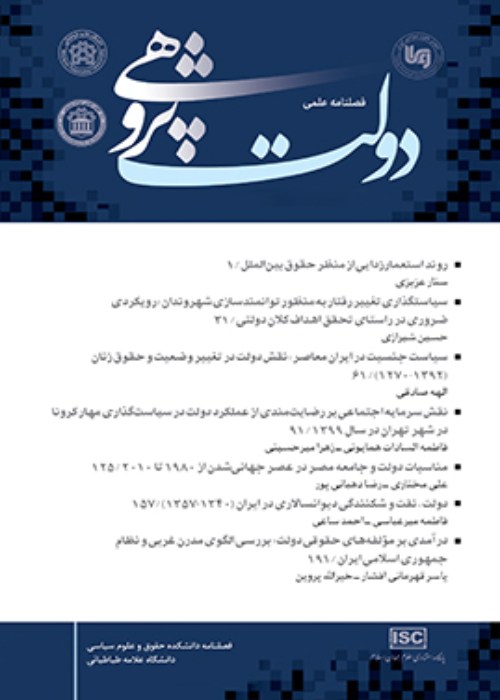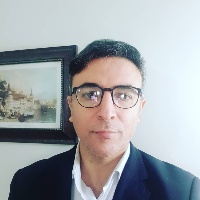The Elementary Forms of Petro-Life (Towards Transforming Rentierism and Rentier State Literature)
Author(s):
Abstract:
The present article is an attempt to describe the elementary forms of petro-life in the Middle East. I have tried to provide the readers, as far as possible, with a coherent theoretical framework about Middle East petro-societies by formulating “Hydrocarbonism” (as an alternative approach to Rentierism) and by proposing a series of new concepts such as “Hydrocarbonic Man and Society, Hydrocarbonic Mode of Production, Quasi-Market, Middle Eastern State of Nature, Welfare Technocracy, Rent Wishing Syndrom, Social-X-Factor, Middle Eastern Social Contract, and Tax Leviathan”.These concepts have had a central position in my perception of life of mind and living experience of human beings in the Middle East petro-societies. By proposing these concepts in the political economy and political sociology of Middle East, I wish to answer the fundamental question of “How can we understand the nature and the work procedure of Middle East petro-societies and the elementary forms of life inside them?.” In this regard, I have presented five basic arguments as follows:First of all; “Tradition, Petroleum and Quasi-Market” are a unified totality and the main sources of transition in the Middle East petro-societies from “Hydraulic Mode of Production” in Pre-Capitalist era to a “Hydrocarbonic Mode of Production” in twentieth century. These three inseparable sources, above all, have influenced the life of mind and the living experience of man in the Middle East petro-societies more than any other factor. Such resources as tradition, petroleum and quasi-market have given a particular feature to these societies which comprises a special internal dynamism to which are added their own content and values.Second, we can assume the endless unity of “Tradition, Petroleum and Quasi-Market” as a sort of “Middle Eastern State of Nature” which underlies establishment of a “Welfare Technocracy” (potent or impotent) in these hydrocarbonic societies. In such a condition, elites of power take advantage of welfare technocracy in order to continuously purchase political goods from social markets, an action which consequently ends in manipulation and distortion of “income, consumption and political life” in their own social context.Third, the result of this “Middle Eastern State of Nature” is the passivity of human subject due to his weakness and benefit at the same time and this State of Nature solves constantly “dilemma of reproduction” of established paradigms of power in these societies.Fourth, inability of welfare technocracy in the ongoing generation of “social-X-factor” gradually led to extreme alienation, decline of all forms of capital and finally, decrease in “sustainable economic growth along with embedded political development” in these societies.Fifth, moving towards a kind of “Middle Eastern Social Contract” and establishing a “Tax Leviathan” is a passing prerequisite, however, it is difficult and complicated for the Middle East hydrocarbonic societies. They have to leave their own specific state of nature and move towards their own especial social state.In order to understand the nature, work procedure and elementary forms of life in the Middle East hydrocarbonic societies, I have focused on these societies in their specific historical horizon and their own social context. I have also tried to reconstruct the experience of hydrocarbonic human via empathetic experience of his world-life.Accordingly, in the first section of the article, while describing the insufficiency of Rentisism literature, I present the “Hydrocarbonism” as an alternative approach. In the second part, I define the hydrocarbonic human and society as well as hydrocarbonic mode of production and I explain the historical process of constructing Hydrocarbonism in the Middle East petro-societies. In the third section, I focus on the causes of permanent unity and alloy-type mixture of “tradition, petroleum and quasi-market” and have described how to turn it to a kind of “state of nature” in the MiddleThe State Studies Quarterly 5East hydrocarbonic societies. In the fourth part, I explain the logic behind establishing welfare technocracy and its instrumental nature in the Middle East hydrocarbonic societies. In the fifth section, I elaborate the passivity of hydrocarbonic human due to his simultaneous weaknesses and benefits. In the sixth section, I explain the life of mind and the living experience of man in the Middle East hydrocarbonic societies. In the seventh part, I focus on the internal contradictions of these societies and at the end, I describe the necessity of moving towards a kind of “Middle Eastern social contract” and establishing a “tax Leviathan” in the Middle East hydrocarbonic societies.
Keywords:
Language:
Persian
Published:
Studies the State, Volume:1 Issue: 2, 2015
Page:
23
magiran.com/p1482288
دانلود و مطالعه متن این مقاله با یکی از روشهای زیر امکان پذیر است:
اشتراک شخصی
با عضویت و پرداخت آنلاین حق اشتراک یکساله به مبلغ 1,390,000ريال میتوانید 70 عنوان مطلب دانلود کنید!
اشتراک سازمانی
به کتابخانه دانشگاه یا محل کار خود پیشنهاد کنید تا اشتراک سازمانی این پایگاه را برای دسترسی نامحدود همه کاربران به متن مطالب تهیه نمایند!
توجه!
- حق عضویت دریافتی صرف حمایت از نشریات عضو و نگهداری، تکمیل و توسعه مگیران میشود.
- پرداخت حق اشتراک و دانلود مقالات اجازه بازنشر آن در سایر رسانههای چاپی و دیجیتال را به کاربر نمیدهد.
دسترسی سراسری کاربران دانشگاه پیام نور!
اعضای هیئت علمی و دانشجویان دانشگاه پیام نور در سراسر کشور، در صورت ثبت نام با ایمیل دانشگاهی، تا پایان فروردین ماه 1403 به مقالات سایت دسترسی خواهند داشت!
In order to view content subscription is required
Personal subscription
Subscribe magiran.com for 70 € euros via PayPal and download 70 articles during a year.
Organization subscription
Please contact us to subscribe your university or library for unlimited access!



